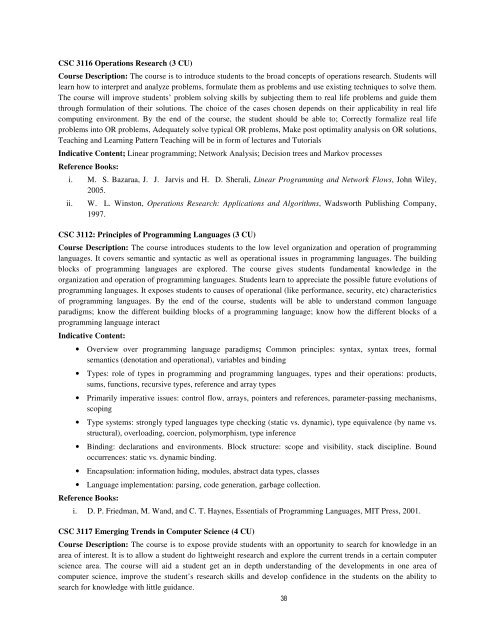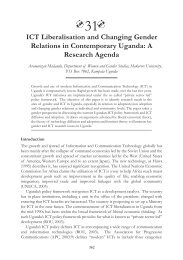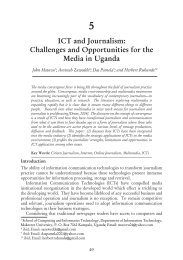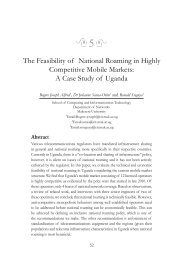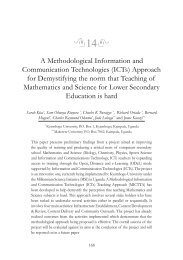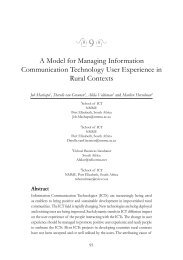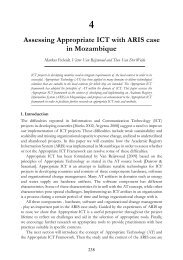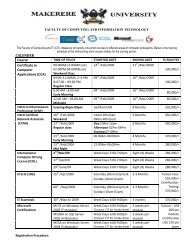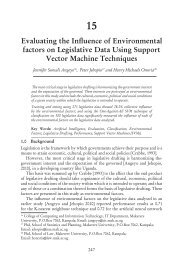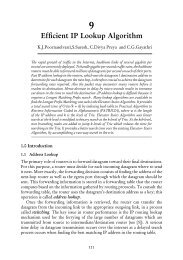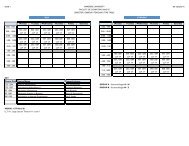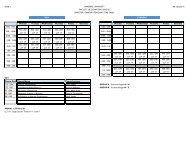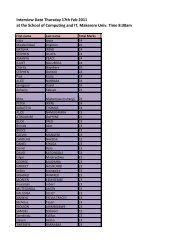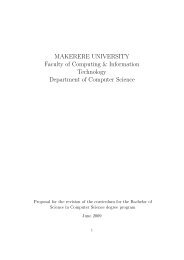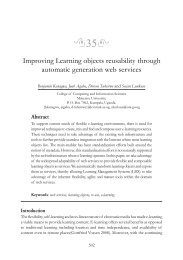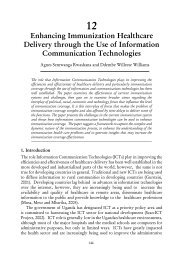Undergraduate Handbook - School of Computing and Informatics ...
Undergraduate Handbook - School of Computing and Informatics ...
Undergraduate Handbook - School of Computing and Informatics ...
Create successful ePaper yourself
Turn your PDF publications into a flip-book with our unique Google optimized e-Paper software.
CSC 3116 Operations Research (3 CU)<br />
Course Description: The course is to introduce students to the broad concepts <strong>of</strong> operations research. Students will<br />
learn how to interpret <strong>and</strong> analyze problems, formulate them as problems <strong>and</strong> use existing techniques to solve them.<br />
The course will improve students’ problem solving skills by subjecting them to real life problems <strong>and</strong> guide them<br />
through formulation <strong>of</strong> their solutions. The choice <strong>of</strong> the cases chosen depends on their applicability in real life<br />
computing environment. By the end <strong>of</strong> the course, the student should be able to; Correctly formalize real life<br />
problems into OR problems, Adequately solve typical OR problems, Make post optimality analysis on OR solutions,<br />
Teaching <strong>and</strong> Learning Pattern Teaching will be in form <strong>of</strong> lectures <strong>and</strong> Tutorials<br />
Indicative Content; Linear programming; Network Analysis; Decision trees <strong>and</strong> Markov processes<br />
Reference Books:<br />
i. M. S. Bazaraa, J. J. Jarvis <strong>and</strong> H. D. Sherali, Linear Programming <strong>and</strong> Network Flows, John Wiley,<br />
2005.<br />
ii. W. L. Winston, Operations Research: Applications <strong>and</strong> Algorithms, Wadsworth Publishing Company,<br />
1997.<br />
CSC 3112: Principles <strong>of</strong> Programming Languages (3 CU)<br />
Course Description: The course introduces students to the low level organization <strong>and</strong> operation <strong>of</strong> programming<br />
languages. It covers semantic <strong>and</strong> syntactic as well as operational issues in programming languages. The building<br />
blocks <strong>of</strong> programming languages are explored. The course gives students fundamental knowledge in the<br />
organization <strong>and</strong> operation <strong>of</strong> programming languages. Students learn to appreciate the possible future evolutions <strong>of</strong><br />
programming languages. It exposes students to causes <strong>of</strong> operational (like performance, security, etc) characteristics<br />
<strong>of</strong> programming languages. By the end <strong>of</strong> the course, students will be able to underst<strong>and</strong> common language<br />
paradigms; know the different building blocks <strong>of</strong> a programming language; know how the different blocks <strong>of</strong> a<br />
programming language interact<br />
Indicative Content:<br />
• Overview over programming language paradigms; Common principles: syntax, syntax trees, formal<br />
semantics (denotation <strong>and</strong> operational), variables <strong>and</strong> binding<br />
• Types: role <strong>of</strong> types in programming <strong>and</strong> programming languages, types <strong>and</strong> their operations: products,<br />
sums, functions, recursive types, reference <strong>and</strong> array types<br />
• Primarily imperative issues: control flow, arrays, pointers <strong>and</strong> references, parameter-passing mechanisms,<br />
scoping<br />
• Type systems: strongly typed languages type checking (static vs. dynamic), type equivalence (by name vs.<br />
structural), overloading, coercion, polymorphism, type inference<br />
• Binding: declarations <strong>and</strong> environments. Block structure: scope <strong>and</strong> visibility, stack discipline. Bound<br />
occurrences: static vs. dynamic binding.<br />
• Encapsulation: information hiding, modules, abstract data types, classes<br />
• Language implementation: parsing, code generation, garbage collection.<br />
Reference Books:<br />
i. D. P. Friedman, M. W<strong>and</strong>, <strong>and</strong> C. T. Haynes, Essentials <strong>of</strong> Programming Languages, MIT Press, 2001.<br />
CSC 3117 Emerging Trends in Computer Science (4 CU)<br />
Course Description: The course is to expose provide students with an opportunity to search for knowledge in an<br />
area <strong>of</strong> interest. It is to allow a student do lightweight research <strong>and</strong> explore the current trends in a certain computer<br />
science area. The course will aid a student get an in depth underst<strong>and</strong>ing <strong>of</strong> the developments in one area <strong>of</strong><br />
computer science, improve the student’s research skills <strong>and</strong> develop confidence in the students on the ability to<br />
search for knowledge with little guidance.<br />
38


